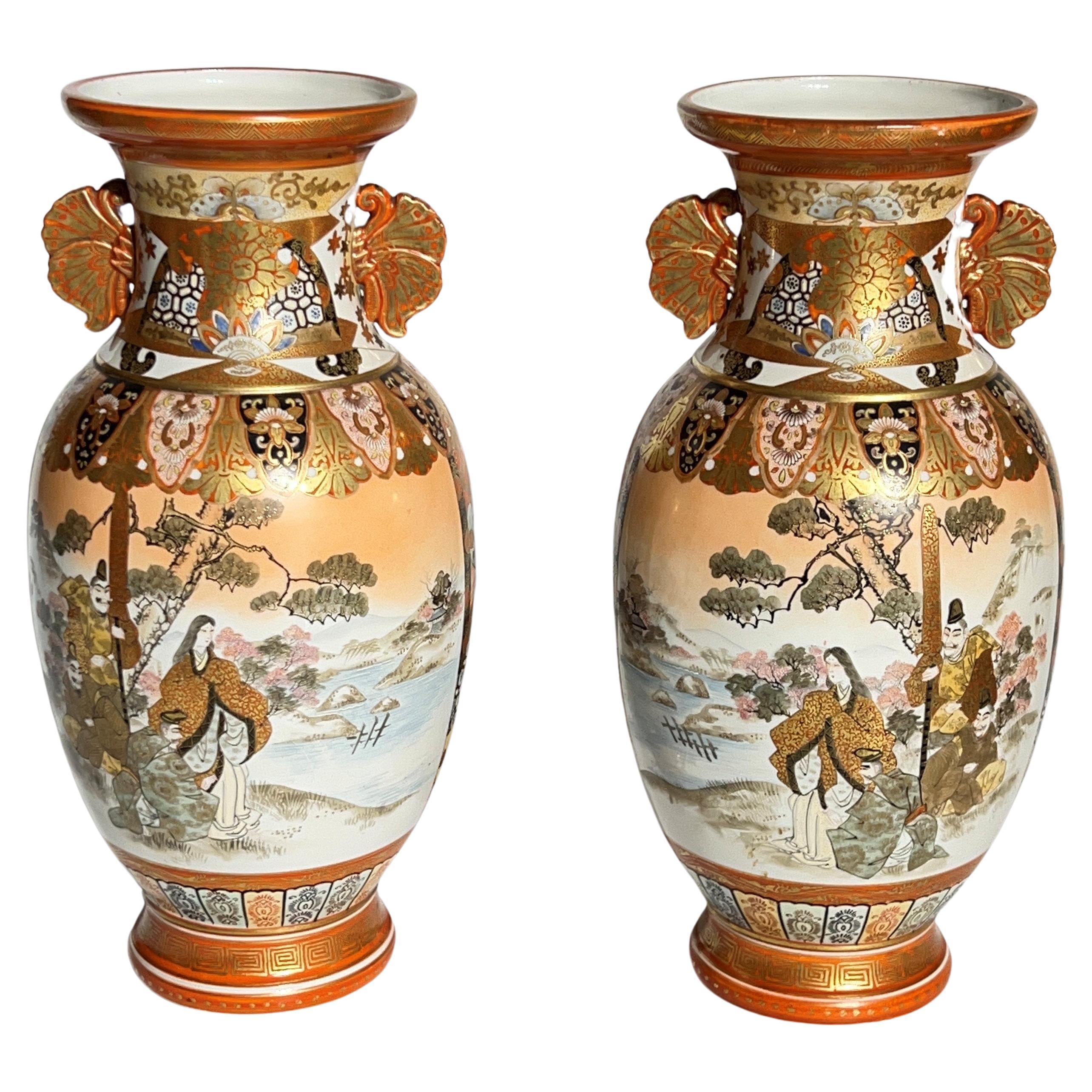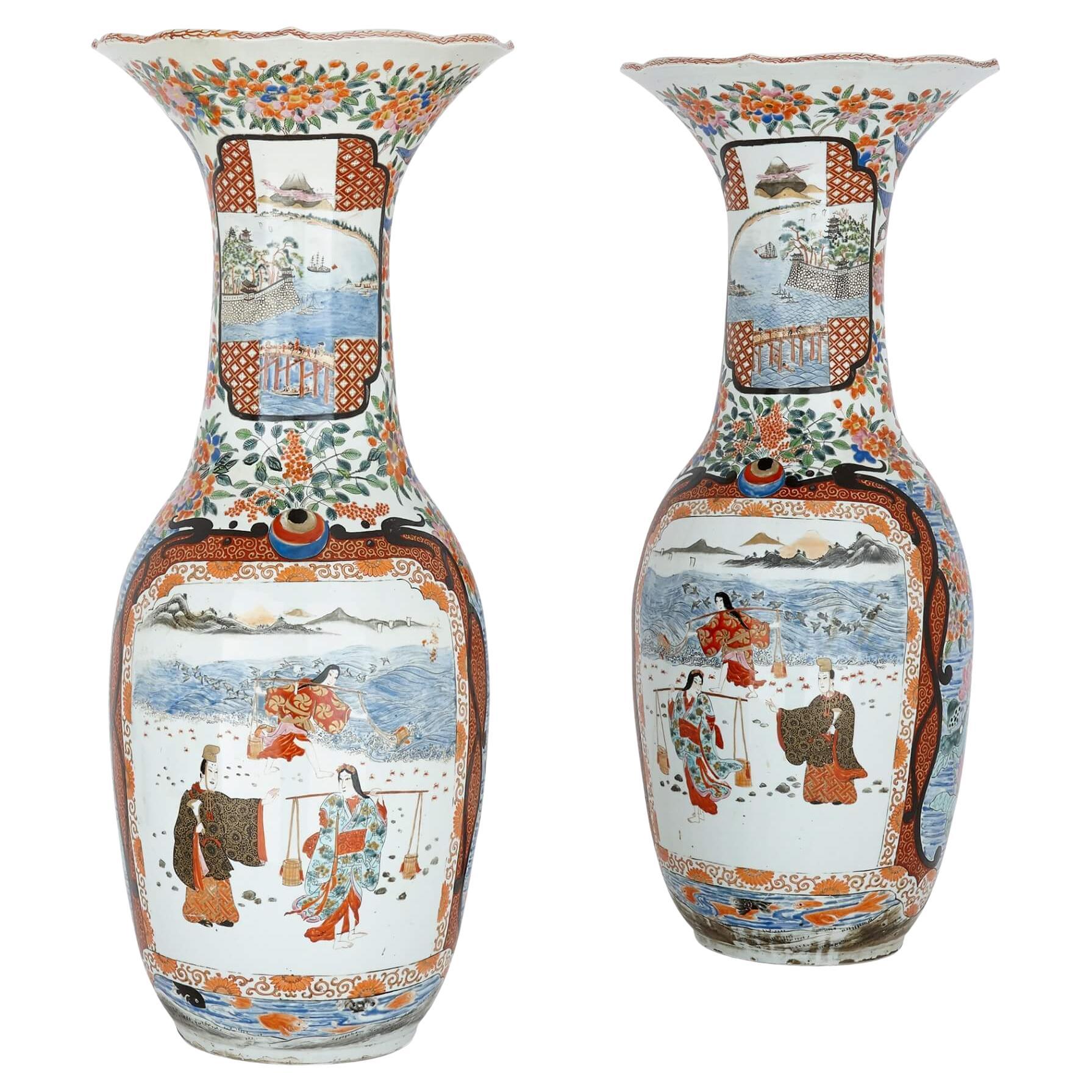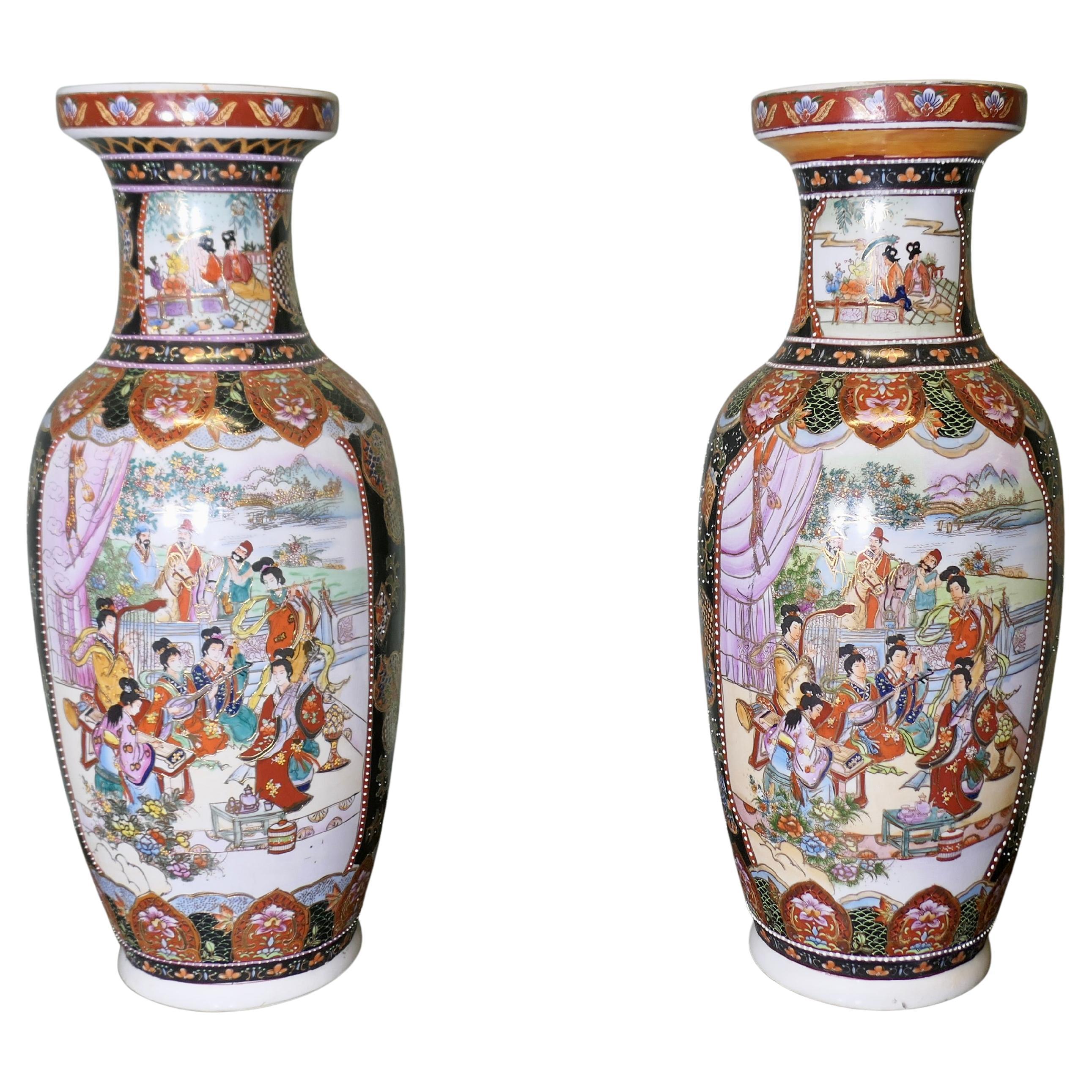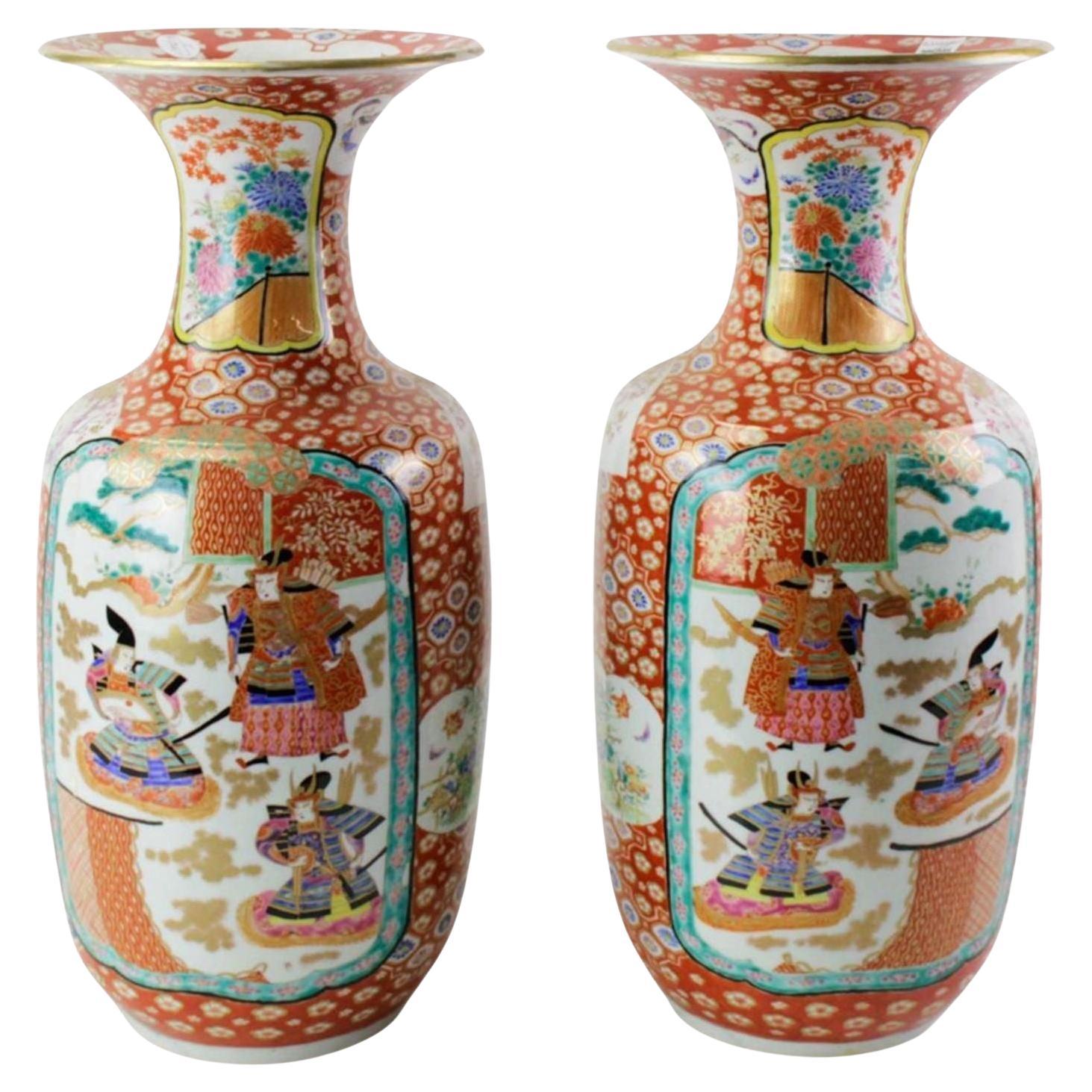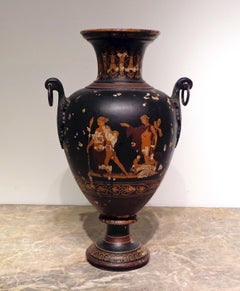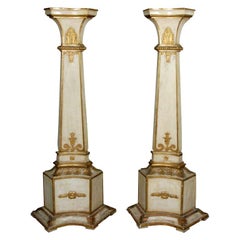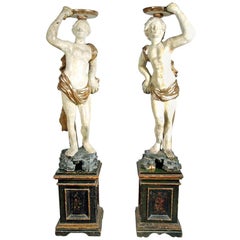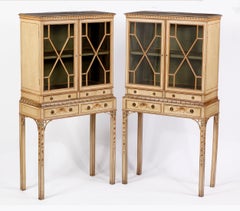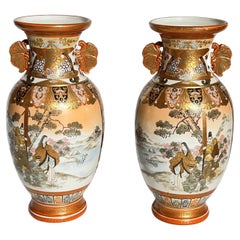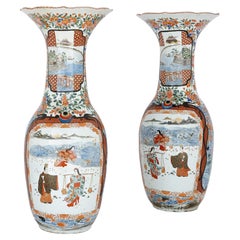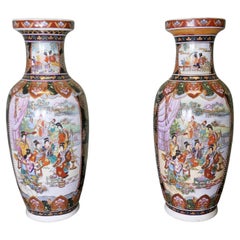Items Similar to Pair of Large Porcelain Vases Kutani Period
Want more images or videos?
Request additional images or videos from the seller
1 of 8
Pair of Large Porcelain Vases Kutani Period
$22,900per set
£17,282per set
€19,785.28per set
CA$32,296.59per set
A$35,457.63per set
CHF 18,498.32per set
MX$429,086.69per set
NOK 231,847.75per set
SEK 218,461.53per set
DKK 147,691.82per set
About the Item
A Pair of Large Porcelain Vases
Kutani Period
Japan, Circa 1830
The covered baluster vases decorated in polychrome enamels and gilt over a clear glaze with panels of courtiers, the surrounding areas painted with various birds, the neck and foot banded by ket frets; chrysanthemum finial
Height 34in.
Kutani
The word Kutani means Nine Valleys and is the name of an area and a village. The two characters that make up the word Kutani consist of the character for "nine", ku and "valley". Since Kutani is a place, almost all pieces marked Kutani were decorated there even if by any of the many manufacturers or trading shops, rather than just a single factory. Porcelain decorators familiar with the Kutani style could also move around so as an example we can sometimes find pieces marked Yokohama & Kobe with decoration in typical Kutani style. Many Kutani made pieces might also have just the artist's as a mark, and no location at all, leading us to also needing to look at style as a clue to the origin of a piece.
Ancient history
The first time we hear of porcelain from the Kutani (nine valleys) Village, was in 1655, in the in the first year of the Myoreki epoch. Japanese ceramic history has it that stones suitable for porcelain making was found in the Kutani mine of the Daishoji Clan, whereupon Lord Maeda Toshiharu sent Goto Saijiro to the Arita Village in the Hizen province to learn how to make porcelain. Kutani Porcelains from this early period are specifically called Ko-Kutani and are extremely rare. The production of this ware continued for about 50-60 years.
Restoration in 1800
Around 1800 the Kutani kilns was restored in Kasugayama, Kanazawa City to make utilarian porcelains. After just a few years this kiln was destroyed by fire. Around 1806-1820 Honda Sadakichi built new kilns in Wakasugi with the purpose of reviving the old style. In 1823-1831 Yoshidaya Kilns were built in Daishoji at the site of Ko-Kutani to concentrate on commercial porcelain with printed designs. The production continues until today. In the mid-1800s the Kutani name was again revived by a number of skilled craftsmen working in different styles of which Kutani Shoza (1816-1883), working with gaudy enamels and with gold brocade, might be the best known.
Production for Export
During and after the Meiji period (1868-1912) up until today almost all Kutani porcelain in Shoza style was exported. Most of the Kutani porcelain we see today is thus 'Shoza style', 'Yoshida Kiln' export wares, dating from early 19th century up until today.
Birds on Kutani porcelain
Birds as a major motif in a Kutani style appear quite frequently marked Yokohama. Tashiro (Tashiro Shoten - Yokohama 1930s) produced/commissioned many of them. Bird motifs on porcelain with light inkwash technique is highly suggestive of Yokohama style with strong Kutani influence, during the export period. Apparently Kamimoto produced similar pieces to Tashiro - and they were quite popular. There is not a well defined time after the Edo period (1603-1867) where pieces were marked or not marked Kutani and only names appear. They appear randomly except for modern pieces made in Kutani which are almost always marked Kutani.
Provenance:
Private Collection New York
Le Trianon Fine Art & Antiques
Vas1
- Dimensions:Height: 34 in (86.36 cm)Diameter: 24 in (60.96 cm)
- Sold As:Set of 2
- Materials and Techniques:
- Place of Origin:
- Period:
- Date of Manufacture:Circa 1830
- Condition:Wear consistent with age and use. Overall Very Good condition, excellent color, wear consistent with age and use, minor period restoration in one of the lids, great scale and form.
- Seller Location:Sheffield, MA
- Reference Number:Seller: Vas11stDibs: LU2639312488262
About the Seller
4.8
Vetted Professional Seller
Every seller passes strict standards for authenticity and reliability
Established in 1980
1stDibs seller since 2017
50 sales on 1stDibs
Typical response time: 6 hours
- ShippingRetrieving quote...Shipping from: Sheffield, MA
- Return Policy
Authenticity Guarantee
In the unlikely event there’s an issue with an item’s authenticity, contact us within 1 year for a full refund. DetailsMoney-Back Guarantee
If your item is not as described, is damaged in transit, or does not arrive, contact us within 7 days for a full refund. Details24-Hour Cancellation
You have a 24-hour grace period in which to reconsider your purchase, with no questions asked.Vetted Professional Sellers
Our world-class sellers must adhere to strict standards for service and quality, maintaining the integrity of our listings.Price-Match Guarantee
If you find that a seller listed the same item for a lower price elsewhere, we’ll match it.Trusted Global Delivery
Our best-in-class carrier network provides specialized shipping options worldwide, including custom delivery.More From This Seller
View AllA "Grand Tour" Cast Iron Etruscan Vase/Urn
Located in Sheffield, MA
A “Grand Tour”
Cast Iron Etruscan Vase
19th Century
Depicting classical Greek figures, with ring handles with a leaf motif on each side.
Height 20 in.
Vas INV. 9
Category
Antique 19th Century Italian Vases
Materials
Iron
$2,560 Sale Price
24% Off
A Pair of Italian Piedmontese Painted and Gilded Pedestals
Located in Sheffield, MA
Each pedestal decorated throughout
Category
Antique 19th Century Italian Pedestals and Columns
A Rare Pair of Neapolitan Papier Mache Figures on Plinths
Located in Sheffield, MA
Each figure is painted and gilded, and each resting on painted and polychromed plinths
Category
Antique 18th Century and Earlier Italian Sculptures
A Fine & Rare Pair of George III Painted Diminuitive Cabinets on Stands
Located in Sheffield, MA
Each with a molded cornice above a pair of diamond mullioned glazed doors opening to a shelf, over two a pair of drawers, raised on square legs headed by pierced brackets, painted wi...
Category
Antique 18th Century and Earlier British Cabinets
Materials
Wood
A Unique Vase Signed Michele Luzoro
By Michele Luzoro
Located in Sheffield, MA
A Unique Vase
Signed Michele Luzoro
Height 14 in.
Founded in 1977 Verrerie d’art Luzoro is a small studio in Biot, a littl...
Category
Late 20th Century French Vases
A Fine Pair of Italian Marble Shell Form Architectural Elements
Located in Sheffield, MA
Each with wonderful patina
Category
Antique 19th Century Architectural Elements
Materials
Marble
$6,080 Sale Price / set
28% Off
You May Also Like
Pair Japanese Kutani Porcelain Vases
Located in New York, NY
Pair of exquisite Japanese Kutani vases with fine enameled and gilt decorations, signed Kutani-Saku (九谷作), measuring 14 1/2 by 6 1/2 inches. Each in excellent condition.
Category
Antique Early 1900s Japanese Ceramics
Materials
Porcelain
$2,200 / set
Pair of antique Japanese porcelain vases
Located in London, GB
Pair of antique Japanese porcelain vases
Japanese, early 20th Century
Height 86.5cm, diameter 36cm
The beautiful Imari porcelain vases...
Category
Early 20th Century Japanese Vases
Materials
Porcelain
$8,960 / set
A Pair of Large Oriental Ceramic Wedding Vases
Located in Godshill, Isle of Wight
A Pair of Large Oriental Ceramic Wedding Vases
This superb pair of Wedding vases have traditional hand decorated designs, they are in excellent condition with no damage.
The wedding...
Category
Vintage 1970s Japonisme Vases
Materials
Ceramic
Large Pair of 19th Century Japanese Arita Porcelain Vases
Located in Brighton, Sussex
A good quality pair of large 19th century Japanese flared neck Arita vases, each with lacquered panels depicting scenes of two girls in the garden, ...
Category
Antique Late 19th Century Japanese Vases
Materials
Porcelain
Pair of Late 19th Century Japanese Porcelain Vases
Located in Los Angeles, CA
Beautiful pair of Late 19th Century Japanese porcelain vases showcasing a mesmerizing blend of artistic depictions and cultural s...
Category
Antique Late 19th Century Japanese Vases
Materials
Porcelain
Pair 19th Century Kutani Vases
Located in Brighton, Sussex
A good quality decorative pair of 19th century Japanese Kutani vases, each having mythical dragons wrapped around the vases amongst flowers and moitfs.
Category
Antique 19th Century Japanese Vases
Materials
Porcelain
$4,135 / set
More Ways To Browse
Large Porcelain Vases
Pair Of Large Vases
Large Antique Porcelain Vase
Antique Porcelain Bird
Brown Vase With Painted Bird
Kutani Vases
Japanese Kutani Vase
Japanese Kutani Porcelain Vases
Japanese Baluster Vase
Ko Kutani
Modern Kutani
Antique Japanese Vase
Mid Century Vase Stoneware
Antique Blue Vases
Brown Pottery Vase
Vase Rare
Pottery Germany
Vintage Bathroom Design
